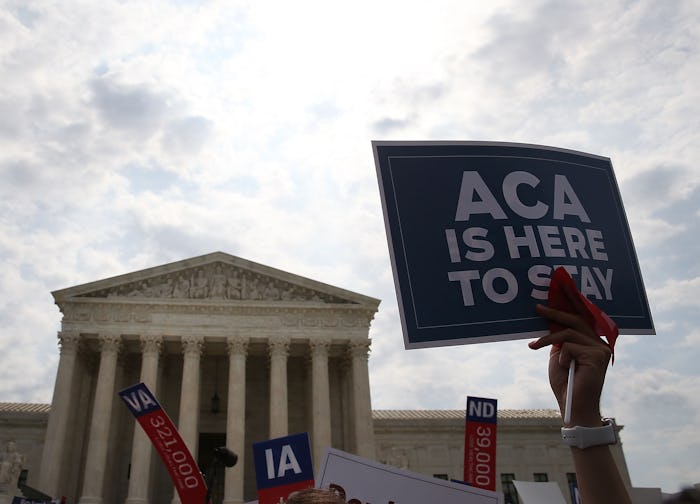Life

What Is Title I Of The Affordable Care Act?
Republican politicians are pushing revised legislation to repeal and replace the Affordable Care Act, also known as Obamacare, so health care coverage is back in the news again. And although subsets of the House — such as the House Freedom Caucus — have given approval for a new, arguably more conservative version of a bill to replace the ACA, the future of the new legislation is in question. It would mean less coverage, or no coverage, for more people, and that's not exactly a popular position. And it appears that parts of Title I of the ACA are most threatened by the new bill. What is Title I of the ACA, and what protections included in it might be threatened by the newest version of the American Health Care Act?
According to The Hill, one of the main provisions in Title I that is being put to the test is the part that protects people with pre-existing health conditions. With the Affordable Care Act, people were not supposed to be charged more for having a pre-existing condition. However, according to that outlet, the revised AHCA bill would allow those charges in states granted a waiver from some of the protections initiated by Obamacare.
According to The New York Times, Republicans claim the new bill maintains protections for those with pre-existing conditions. However, Democrats say the previously-mentioned waivers would weaken those protections because insurers could, under the revision, charge higher premiums to sick people who wanted to buy insurance after a period without coverage.
What else does Title I do? The Balance laid out a summary of each of the 10 titles and sections of the Affordable Care Act, and according to that site, Title I — Quality, Affordable Health Care for All Americans — put in place several safeguards that many rely on for health care coverage.
The Balance reported that in 2014, Title I required that the 32-50 million uninsured Americans buy insurance — or pay a tax of up to 1 percent of their income as a penalty. It set up health insurance exchanges, and required businesses with 50 or more employees to offer health insurance to those employees.
Title I, according to The Balance, required insurance companies to provide benefits like the following:
- The ability for parents to add/keep children up to age 26 on their plans.
- No ceiling on lifetime coverage — including protections against insurance companies dropping people if they get sick.
- No denial of coverage to those with pre-existing conditions.
- Wellness or pregnancy exams 100 percent covered under new plans.
So, clearly, Title I is pretty important. It ensures that parents can keep their children covered until they're 26, providing coverage to millions as they establish their own careers. It protects those with pre-existing conditions and people who get sick, which isn't something that can be always be planned for. And it guarantees pregnancy exams for expectant mothers — again, protecting millions.
Now that a revision of the AHCA is being debated, some moderate Republican lawmakers are opposing it specifically because it might reverse course on protecting those with pre-existing conditions — a protection put in place by Title I.
According to Paste Magazine, Republicans are trying to revive the AHCA in an attempt to improve the list of achievements Trump has made in his first 100 days in office. That milestone will be met this weekend, but New York Magazine reported that there will be no vote on the AHCA on Friday because Republicans still don't have the votes to secure the bill's passage.
It appears that to many politicians, some of the protections outlined in Title I of the ACA are important enough to derail the entire vote on the revised AHCA. And for good reason. According to the Center for American Progress, more than 130 million Americans have a pre-existing health condition. How many of those would lose coverage under the AHCA — coverage they were guaranteed under Title I of the ACA? The number would be astounding. Title I and the safeguards it guarantees are incredibly important to an incredible number of people — and representatives voting whether to gut those protections need to consider that fact very carefully.